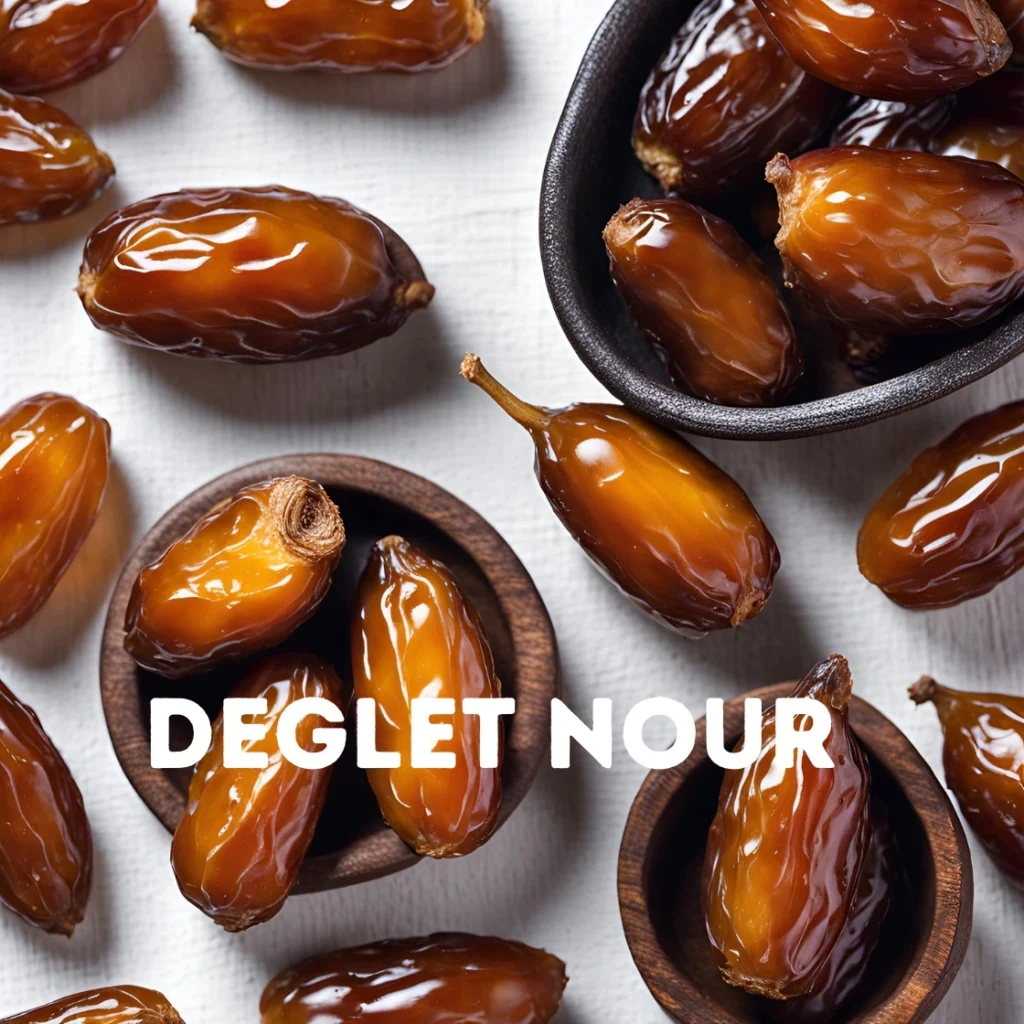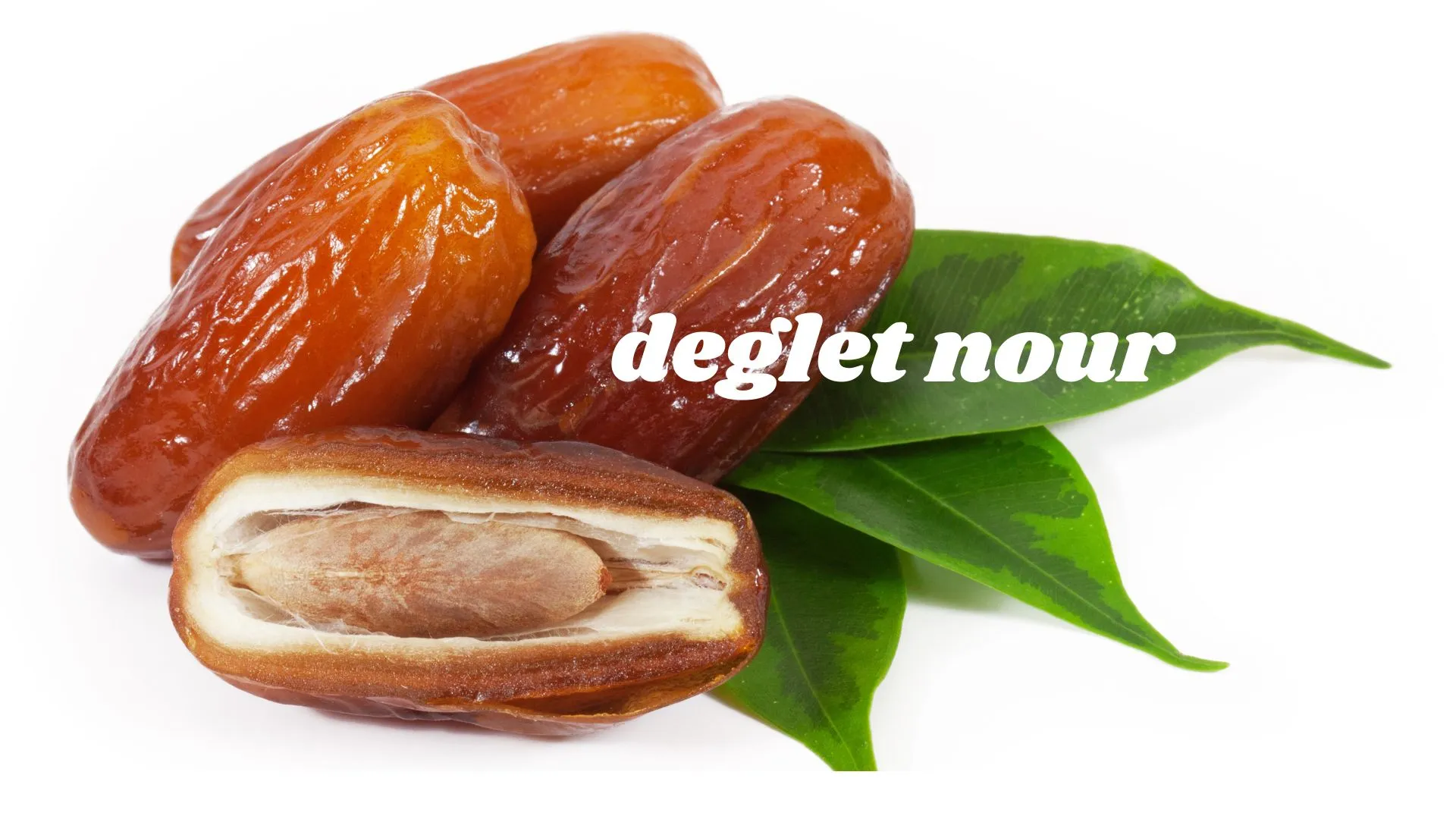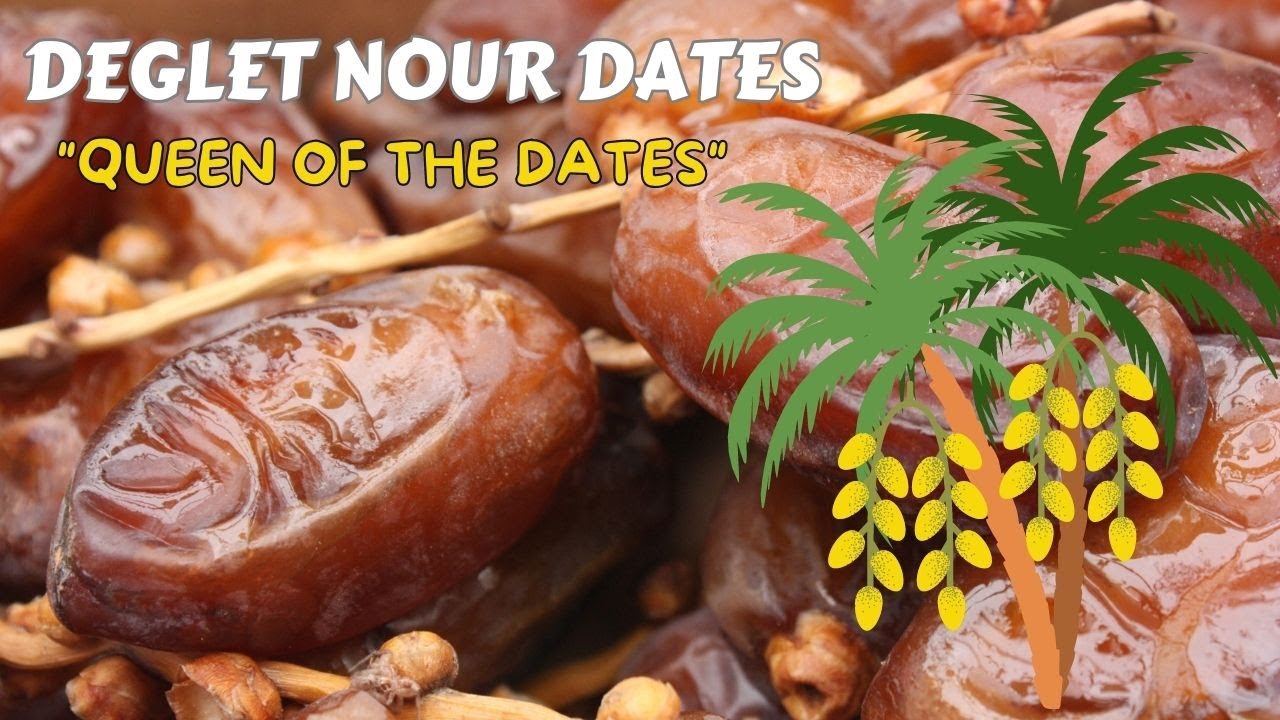The cultivation of Deglet Nour dates is mainly concentrated in North Africa, particularly in Tunisia and Algeria, where they are widely grown. They have also been introduced to other regions, such as the United States and some Middle Eastern countries, but the quality obtained remains lower than that of Tunisian and Algerian Deglet Nour dates.
Deglet Nour dates grow in a hot and dry climate, with little rainfall, on well-drained and aerated soils, usually in irrigated oases. To this day, pollination is carried out manually, because date palms grow on separate trees: male and female flowers are found on different trees. This manual pollination is called “tadhkaar” in the local dialect.
Farmers carefully monitor the development of the fruits and protect the clusters from rain, hail, and birds by using plastic bags. The harvest is carried out in multiple stages to ensure that the dates are picked at full ripeness.
Deglet Nour Dates Through History
Deglet Nour is an ancient variety deeply rooted in history. Although the exact date of its introduction is unknown, historical evidence shows that it was cultivated for millennia before our era by the indigenous populations of North Africa. To this day, it remains closely connected to the culture, traditions, and cuisine of the people in this region.
Physical Characteristics
The Deglet Nour dates is medium to large in size, measuring between 4 and 6 cm in length and weighing between 6 and 9 g. Its color is golden yellow and translucent when ripe, with tender yet firm flesh, smooth skin, and low moisture content at maturity. Its taste is sweet, with a flavor reminiscent of caramel.
.
Nutritional Value
100 g of Deglet Nour Dates
| energy | 282kcal |
| water | 20.5g |
| Protein | 2.45g |
| lipide | 0.39g |
| Carbohydrate | 75g |
| Fibres | 8g |
| saccharose | 23.8g |
| Glucose | 19.9g |
| Fructose | 19.6g |
| Calcium, Ca | 39mg |
| fer, Fe | 1.02mg |
| Magnesium, Mg | 43mg |
| Phosphore, P | 62mg |
| Potassium, K | 656mg |
| Sodium, Na | 2mg |
| Zinc, Zn | 0.29mg |
| Vitamin C | 0.4mg |
| Vitamin E (alpha-tocopherol) | 0.05mg |
| Selenium, Se | 3µg |
source ;U.S. Department of Agriculture
It is noted that Deglet Nour dates are very rich in minerals and antioxidants, and they are a highly energetic food, making them very beneficial for health.
Storage and Preservation
Storage and preservation are essential steps to ensure the marketing of Deglet Nour dates throughout the year, especially during periods of high consumption, such as the month of Ramadan, which can sometimes occur several months after the harvest. They are also crucial for global marketing, in order to maintain quality, nutritional value, and prevent fruit deterioration.
Short-Term Storage
If the storage is planned for a few days or weeks, Deglet Nour dates can be kept at room temperature, between 20 and 25°C, in airtight boxes or containers. It is essential to control the humidity level and avoid direct exposure to sunlight, as this can cause the dates to deteriorate quickly.
The humidity level should be maintained between 50% and 60%. Too high humidity would make Deglet Nour dates sticky, very soft, and more vulnerable to mold formation. Conversely, too low humidity could cause them to dry out and shrink, thus altering their full and appealing appearance.
It is also important not to store Deglet Nour dates with other fruits or vegetables, as this could affect their quality. Even for short-term storage or during transport, it is recommended to maintain a temperature between 0 and 5°C.
Medium- and Long-Term Storage
For storage of 3 to 6 months, Deglet Nour dates can be kept at a temperature between 0 and 4°C, while monitoring the humidity level (generally maintained between 50% and 60%) and protecting them from light. However, for periods longer than 6 months, it is preferable to store the dates in a freezer at a temperature of -18°C.
At this temperature, Deglet Nour dates retain their color, attractive appearance, taste, and nutritional value. Indeed, this temperature halts all microbial activity and the chemical reactions responsible for the deterioration or discoloration of the dates.
It is important to place the dates in airtight boxes or containers to prevent freezer burn. Nevertheless, periodic inspection of the stored dates is necessary to detect any signs of mold or deterioration.

conclusion
Deglet Nour dates are considered one of the most delicious and highest-quality varieties. They have a high nutritional value and are in great demand on international markets.
However, at the local level, they require more effort and reforms, particularly technical support for farmers. For example, it is crucial to prevent harvesting before the Deglet Nour dates are fully ripe, as this could lead to their deterioration, significant losses for traders and suppliers, and damage the global reputation of this high-quality product.
Furthermore, it is essential to adopt modern storage and packaging techniques. The Deglet Nour date sector remains important both internationally and locally..
Frequently Asked Questions
Is Deglet Nour Algerian?
Deglet Nour is produced in very large quantities in Algeria (production: 1.4 million tons), which is the world’s largest producer of this date variety. It is also widely cultivated in Tunisia, where it is produced in significant quantities as well (production: 225,000 tons), and Deglet Nour can also be found in Libya.
Why is Deglet Nour called by this name?
Deglet Nour (nour in Arabic means “light,” and deglet in the North African dialect means “dates,” i.e., “luminous dates”) gets its name from its golden color, which lets sunlight pass through, giving it a bright and radiant appearance. This characteristic is utilized by traders of this date variety, who often place powerful lamps directly on the dates. This highlights their golden and attractive glow, thereby drawing customers’ attention.
Is Deglet Nour Tunisian?
Yes, large quantities of Tunisian Deglet Nour dates are produced and exported to several countries. However, the main production is in Algeria.
How many calories does a Deglet Nour date contain?
100 g of Deglet Nour dates contain approximately 282 calories.
Should dates be washed?
Yes, it is generally recommended to wash dates before consuming them, even if they appear clean. Here’s why:
Remove residues: Dates may contain dust, chemical residues (possible pesticides or treatment products), or contaminants from transport or storage.
Reduce bacterial risks: Although dates are often dried and naturally protected by their skin, they can be exposed to bacteria or insects during handling.
Prefer gentle washing: Rinse the dates quickly under clean water. If needed, rub them lightly with your fingers. Pat them dry with a clean cloth or paper towel before consuming.
Exception: If the dates are sold in sealed packaging with health certification (ready to eat), washing is not mandatory but can be done as a precaution.



